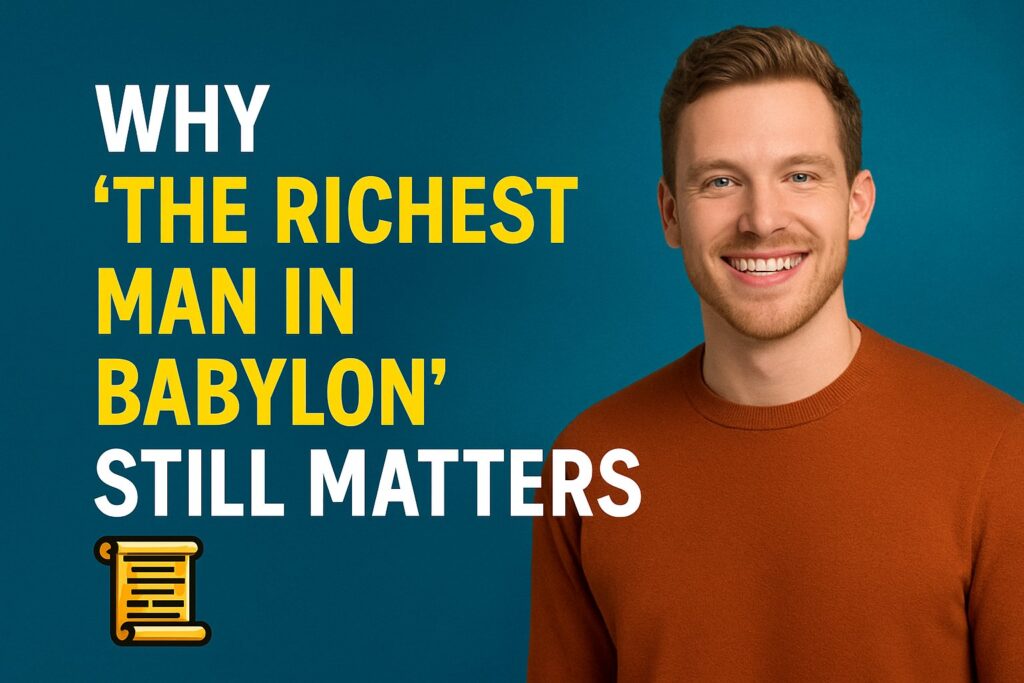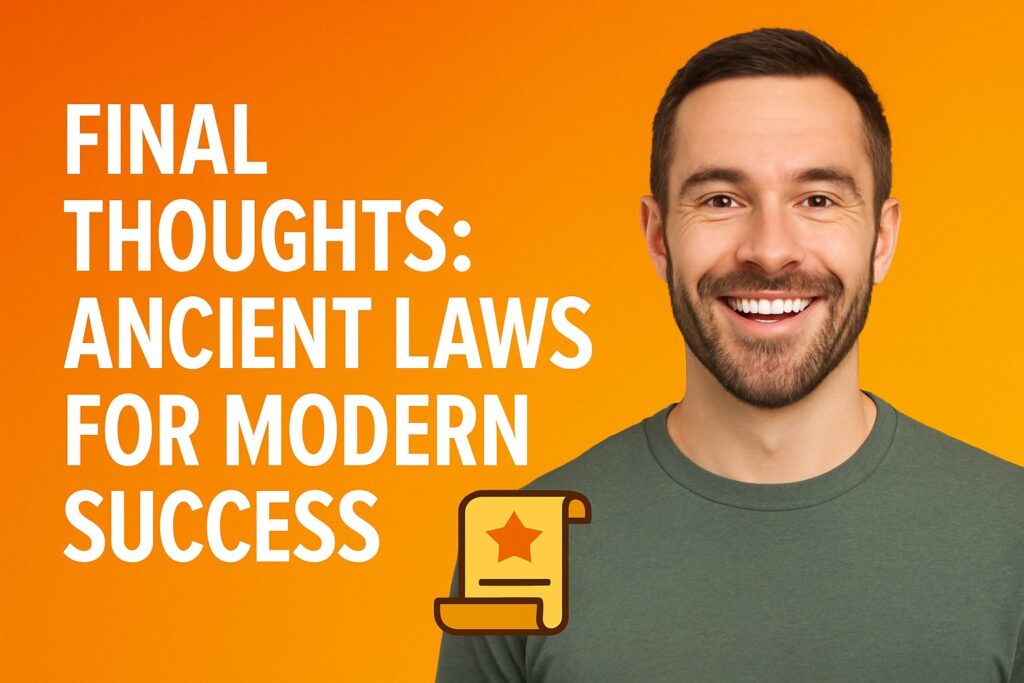1. Introduction: Timeless Wealth Wisdom

For centuries, financial success has seemed like a mystery to many, often shrouded in technical jargon, confusing strategies, and overwhelming advice. Yet, in the 1920s, a small book titled ‘The Richest Man in Babylon’ cut through the noise with ancient yet surprisingly simple wisdom that remains profoundly relevant today. Written by George S. Clason, this enduring classic uses parables set in ancient Babylon to convey powerful lessons on wealth-building, saving, investing, and financial discipline.
With economic uncertainty, inflation, and debt continuing to plague individuals and families around the world, Clason’s book has only grown more popular. What makes it stand out isn’t just its age or storytelling—it’s the timeless truths it imparts, truths that apply whether you’re earning minimum wage or building a multi-million-dollar portfolio.
At the core of the book is a belief that anyone can become financially successful, no matter their background, income, or formal education. Through characters like Arkad, the titular “richest man,” the book shares principles that are not only actionable but universally applicable. These are not tips reserved for Wall Street insiders; they’re life strategies grounded in common sense and human behavior.
This blog post will explore the most impactful takeaways from the book, break down its core teachings, and show you how to apply these ancient financial principles to modern-day life. Whether you’re just starting your financial journey or looking to refine your approach to money, this guide is designed to be your roadmap.
Each section of this post builds on the next, culminating in a complete understanding of how the “Babylonian system” of personal finance can help you:
- Save consistently, even on a tight income
- Spend wisely and avoid unnecessary debt
- Grow your wealth through smart investments
- Protect your assets and plan for the future
Let’s dive into the wisdom of Babylon—a civilization long gone, yet more financially literate than most people today. In a world filled with financial complexity, perhaps the best advice is still the simplest. For more inspiration on mastering personal finance, explore the comprehensive guides available at Investopedia.
2. Why ‘The Richest Man in Babylon’ Still Matters

In a world where new personal finance books are released every month, it’s remarkable that a slim volume written in the 1920s still consistently ranks among the most recommended financial guides of all time. ‘The Richest Man in Babylon’ stands apart because it offers more than just money tips—it delivers life principles rooted in clarity, discipline, and universal truth. Its teachings are simple, yet they transcend time, technology, and trends.
Financial markets have evolved. We now have crypto, NFTs, robo-advisors, and contactless payments. Yet, the core challenges remain unchanged: people still struggle to save, overspend on lifestyle upgrades, fall into debt traps, and neglect to plan for the future. These modern dilemmas echo the same problems faced by the Babylonians in Clason’s stories—a powerful reminder that financial success is less about new tools and more about timeless principles.
One of the key reasons the book has remained so influential is its accessibility. Unlike modern finance books that can overwhelm readers with complex charts or technical language, Clason uses simple parables and relatable characters to deliver his message. Readers don’t just learn; they remember. Stories like Arkad’s or Dabasir’s resonate long after the book is closed.
Modern financial experts continue to praise the book’s clarity. In fact, many prominent educators and entrepreneurs list it as required reading for anyone seeking financial independence. Personal finance icons like Dave Ramsey and Robert Kiyosaki have cited it as foundational to their early money mindset. Even influencers on platforms like YouTube and Reddit regularly recommend it to beginners looking for a no-nonsense financial philosophy.
More than a relic of the past, ‘The Richest Man in Babylon’ serves as a guidepost for financial wisdom in the digital age. It reminds us that wealth is not about luck or intelligence—it’s about discipline, intention, and action. And that’s a message we still need, perhaps now more than ever.
If you’ve never read it, you can access many editions at your local library or through platforms like Goodreads. For a broader historical view of personal finance evolution, visit the National Bureau of Economic Research, which offers research into household finance trends over time. You can also find discussions and book recommendations in active finance forums on Reddit’s r/personalfinance.
3. Meet Arkad — The Wealthiest Man in Babylon

Every great financial story has a hero, and in ‘The Richest Man in Babylon’, that hero is Arkad. Known far and wide for his immense fortune and wise counsel, Arkad is the book’s central figure—and its most powerful teaching tool. He didn’t inherit wealth. He wasn’t lucky. Instead, he built his fortune using simple but consistent principles that anyone can apply. Through his story, George S. Clason makes an ancient concept both personal and relatable.
Arkad began as a humble scribe—someone who carved inscriptions into clay tablets for a modest fee. Like most others, he earned money and spent nearly all of it. But unlike others, Arkad became deeply curious about how wealth is created and retained. He sought out Algamish, a wealthy moneylender, and asked a question that still resonates today: “How may I become rich?”
What followed was a mentorship that changed Arkad’s life. Algamish taught him the first and most essential rule of wealth: “A part of all you earn is yours to keep.” Arkad began saving at least 10% of his income, applying the discipline to his daily life. He learned how to invest, how to avoid losing money to poor judgment, and how to grow his knowledge along with his gold. Over time, these lessons transformed Arkad into a man of great substance and influence.
But Arkad’s true greatness wasn’t just in becoming wealthy—it was in teaching others. In the book, he gathers fellow citizens and passes on what he learned, becoming a mentor to an entire generation. His generosity in sharing wisdom is a crucial reminder that wealth isn’t just personal—it’s something that can lift communities when shared responsibly.
Modern educators often cite Arkad as one of literature’s earliest fictional financial mentors. His principles have echoed through generations, influencing everything from financial self-help movements to personal coaching philosophies. According to Morningstar, one of the largest investment research firms, consistent saving and compounding remain the most effective wealth-building strategies—exactly what Arkad practiced in ancient Babylon.
Arkad’s story teaches us that wealth doesn’t begin with a windfall or a big break—it begins with mindset, discipline, and patience. And those qualities remain just as essential in the 21st century as they were in the sands of Babylon. For more historical insights into ancient financial systems, consider exploring the British Museum’s Mesopotamian collection, which includes early examples of cuneiform accounting tablets.
4. The 7 Timeless Financial Principles

Arkad, the richest man in Babylon, didn’t become wealthy by chance. He followed a clear set of practical rules—simple enough to be etched on clay tablets, yet powerful enough to build a fortune. These seven timeless principles form the foundation of Clason’s book and remain just as relevant today. Each one offers a stepping stone toward financial independence, beginning with the golden rule of saving first.
4.1 Start Thy Purse to Fattening

Arkad’s first and most emphasized lesson is this: “A part of all you earn is yours to keep.” In modern terms, this means setting aside a fixed portion of your income—preferably 10%—before you spend a single dollar elsewhere. The idea is both simple and transformative. Most people work hard, get paid, and spend nearly everything they earn. But by paying yourself first, you begin the process of building true financial security.
This principle works because it shifts your mindset. Instead of seeing savings as what’s “left over” after spending, you treat it as a non-negotiable obligation—like rent or utilities. Over time, this habit begins to build momentum, and your “purse,” or savings account, starts to fatten steadily.
Arkad stresses that it doesn’t matter how small the amount. Even one-tenth of your income is enough to start. The discipline is what matters most. In fact, one of the biggest psychological barriers to saving is the belief that you need to earn more first. But Clason’s wisdom flips that idea on its head: You learn to save now, so you are ready when you do earn more later.
To put this into practice today, consider setting up an automatic transfer of 10% from your checking account to a dedicated savings account every payday. Budgeting tools like You Need A Budget (YNAB) or similar apps can help you make this process effortless and consistent. These platforms also allow you to categorize and track where your money goes—so that your savings goals stay front and center.
Clason knew that saving money was only the beginning. A fattened purse gives you options. It allows you to invest, prepare for emergencies, and reduce financial stress. But first, it must be filled—one disciplined deposit at a time. This is the bedrock of wealth creation, and without it, the rest of the financial principles lose their power.
So if you’re just beginning your journey to financial freedom, this is where you start. Don’t wait for the “right time” or a better salary. As Arkad would say, “Ten percent of all you earn is yours to keep. Make it so.”
4.2 Control Thy Expenditures

Arkad’s second lesson addresses a universal trap: the more we earn, the more we spend. Known today as lifestyle inflation, this pattern undermines even the best intentions to save. In ‘The Richest Man in Babylon’, Arkad teaches that wealth isn’t determined by how much you make—it’s determined by how much you keep.
“What each of us calls our ‘necessary expenses’ will always grow to equal our incomes unless we protest to the contrary,” Arkad warns. In other words, unless we take deliberate control, our spending will expand to consume our income. That’s why budgeting is essential—not just to track spending, but to redefine what’s truly necessary.
Modern research backs this up. Behavioral economists have shown that many of our purchasing decisions are not based on logic but on emotion, impulse, and social pressure. We often buy to feel better, to match peers, or to reward ourselves. Understanding this helps explain why higher salaries don’t automatically lead to higher savings. Instead, they often lead to bigger houses, fancier clothes, and more expensive habits—all of which drain wealth instead of building it.
The Babylonian solution? Intentional spending. Arkad recommends reviewing every expense and questioning whether it brings genuine value. That mindset shift is powerful. It doesn’t mean living a life of denial or constant restraint—it means putting purpose behind your purchases. Spend freely on what matters most to you, and ruthlessly eliminate what doesn’t.
Resources like the Consumer Financial Protection Bureau offer modern tools and advice to help Americans budget wisely, avoid overspending, and build sustainable financial habits. Their research-driven approach echoes Arkad’s ancient wisdom: spend with purpose, not pressure.
Controlling expenditures creates margin. It ensures you have room to save, invest, and give without living in financial stress. It transforms your income into a tool rather than a trap—and it sets the stage for the next principle of multiplying your gold.
4.3 Make Thy Gold Multiply

Saving money is only the beginning. To build lasting wealth, Arkad teaches that your gold must work for you. This third principle—“Make thy gold multiply”—is a powerful endorsement of investing. Once your purse has begun to fatten, the next step is to make those savings grow through wise and consistent effort.
In ‘The Richest Man in Babylon’, Arkad explains that money, like a tree, can bear fruit—and that fruit can bear fruit again. This is a classic illustration of compound interest: the idea that earnings reinvested over time will generate exponential growth. It’s not just about making money, but about making your money earn more money while you sleep.
Even in our modern world, this principle remains one of the most reliable paths to wealth. Investing in stocks, index funds, real estate, or dividend-paying assets allows your savings to multiply far beyond what simple saving can achieve. The key, as Arkad would remind us, is consistency. Regular, disciplined investing over long periods creates the momentum needed for significant growth.
To get started, many financial educators recommend beginning with low-cost, diversified index funds. These funds spread your investment across hundreds of companies, reducing risk and maximizing long-term growth potential. You don’t need to be a stock-picking expert to benefit—just someone with patience and commitment.
Time is your greatest ally. Thanks to the power of compounding, the earlier you start, the more your money can grow. For example, someone who begins investing $200 per month at age 25 will accumulate far more than someone who starts at 35, even if the later saver contributes more per month. That’s the magic of growth on growth.
If you’re new to investing, try exploring tools like the Investor.gov compound interest calculator. Run a few scenarios to visualize how regular contributions add up over time. The results may surprise—and motivate—you.
Arkad’s message is timeless: your gold should not sit idle. Put it to work. Whether it’s earning interest, dividends, or rental income, every dollar you invest wisely has the potential to build your wealth steadily and securely.
4.4 Guard Thy Treasures from Loss

Wealth gained can just as easily be wealth lost—unless it is properly protected. In ‘The Richest Man in Babylon’, Arkad teaches that preserving what you have is just as important as earning or growing it. His fourth principle, “Guard thy treasures from loss,” is a call for financial vigilance. In modern terms, it’s about risk management, fraud prevention, and intelligent investing.
Arkad warns against entrusting your gold to those unskilled in its use. That’s timeless advice. Whether it’s investing in a friend’s business without proper planning or buying into a trendy “get-rich-quick” scheme, too many people lose money because they trust the wrong person—or don’t fully understand what they’re investing in.
The modern financial landscape is filled with new tools, platforms, and opportunities. But it’s also filled with scams, misleading advice, and hidden fees. This makes financial education critical. Before placing your money anywhere, ask the same questions Arkad would: Who is handling it? Do they have expertise? Can I verify their results? Have I studied this myself?
Even basic investment tools carry risk. Stocks can fall. Real estate markets can crash. Businesses can fail. That’s why diversification matters—it protects you from catastrophic losses. No single investment should ever determine your future. The same is true for proper insurance: protecting your assets, health, and income against unexpected threats is one of the best defenses you can build.
Arkad also stresses the value of capital preservation. He recommends safe and reliable returns over speculation. While some risk is necessary to grow wealth, the foundation should always be built on sound, stable decisions. Before seeking profit, secure the principal.
One excellent resource for modern investors is the U.S. Securities and Exchange Commission (SEC), which provides free investor education, scam alerts, and practical tips to protect your assets. Their goal aligns with Arkad’s advice: ensure your gold is never placed where it may be lost.
True financial strength isn’t just about how much you can make—it’s about how much you can keep. Guarding your treasures gives you peace of mind and allows your fortune to flourish without fear of unexpected ruin.
4.5 Make of Thy Dwelling a Profitable Investment

In ‘The Richest Man in Babylon’, Arkad urges citizens to “own thy home.” His advice wasn’t about status or luxury—it was about financial security and long-term value. The fifth timeless principle, “Make of thy dwelling a profitable investment,” promotes the idea that where you live shouldn’t just be an expense—it should contribute to your wealth.
For many, a home is the single largest investment they’ll ever make. While rent provides shelter, it builds no equity and gives no return. Ownership, on the other hand, offers stability and the potential for growth in value. Every mortgage payment is not just a bill—it’s a deposit into your future.
Arkad would likely support smart homeownership strategies. That means purchasing within your means, avoiding over-leveraged loans, and choosing properties that align with your long-term goals. He would warn against buying more house than you need or can afford, which is a trap that continues to hinder millions today.
In the modern context, the rent vs. buy debate depends on your lifestyle, location, and financial outlook. Renting offers flexibility and fewer upfront costs, but lacks asset-building. Owning builds wealth over time but comes with maintenance responsibilities and market risk. Tools like mortgage calculators and budgeting platforms can help you decide what’s best for your situation.
Even if you already own a home, Arkad’s principle still applies. Your dwelling can become profitable by generating income—through rental units, co-living arrangements, or home-based businesses. And keeping your home well-maintained increases its long-term value, turning it into a strategic asset rather than just a personal expense.
For trusted guidance on buying, financing, and maintaining a home, explore resources like HUD.gov, the official U.S. Department of Housing and Urban Development. It offers tools for first-time buyers, renters, and homeowners alike.
In Babylon, owning a home meant more than having a roof over your head—it meant claiming your place in society and building a future for your family. Today, the same principle endures: your home should not just be where you live—it should help you live better, financially and otherwise.
4.6 Insure a Future Income

Arkad’s sixth principle, “Insure a future income,” speaks directly to one of our most common financial fears: the uncertainty of tomorrow. In ‘The Richest Man in Babylon’, this principle urges readers to make plans today for the time when they can no longer earn through labor. It’s an ancient idea with modern urgency—especially in a world of rising life expectancies, unpredictable markets, and disappearing pensions.
To Arkad, preparing for the future was a moral duty—to oneself, to one’s family, and to society. He encouraged citizens to think beyond their current work years and to establish reliable sources of income that would continue into old age. In today’s terms, this means retirement planning, building passive income streams, and investing in vehicles that produce income long after your primary career ends.
Modern retirement tools like 401(k)s, IRAs, annuities, and pensions are the successors to Arkad’s philosophy. So are dividend stocks, rental real estate, and income-generating portfolios. The key isn’t the specific tool—it’s the intention behind it: securing future stability with today’s efforts.
One of the most powerful ways to insure future income is to consistently invest in retirement accounts over decades. Small contributions made early in life grow dramatically through compound interest. Even if you start later, disciplined saving can still yield impressive results. According to experts at the AARP, most Americans will need at least 70–80% of their pre-retirement income to maintain their lifestyle—and they urge individuals to start preparing as early as possible.
Another path is developing income streams that are independent of physical labor. This includes rental income, online businesses, intellectual property, or even royalties from creative work. These options align perfectly with Arkad’s vision of future income not reliant on daily toil.
Insurance also plays a role in this principle. Disability insurance, life insurance, and long-term care insurance protect both your income and your loved ones from sudden financial strain. These aren’t just costs—they’re safeguards for your future prosperity.
Ultimately, Arkad reminds us that prosperity isn’t complete unless it extends into the future. “Provide in advance for the needs of thy growing age and the protection of thy family,” he advises. In other words: Plan now, so that the fruits of your labor continue to serve you when you need them most.
4.7 Increase Thy Ability to Earn

The final principle in Arkad’s wealth-building philosophy may be the most empowering: “Increase thy ability to earn.” In ‘The Richest Man in Babylon’, this concept means striving for self-improvement, developing skills, and always looking for ways to become more valuable. In today’s world, this is often the difference between living paycheck to paycheck and achieving long-term financial freedom.
Arkad advises that every person should work not only to earn income but also to grow in ability and wisdom. This mindset cultivates lifelong learners—those who pursue knowledge, seek mentorship, and build expertise in their fields. Whether you’re a tradesperson, entrepreneur, artist, or employee, increasing your skills leads directly to increased opportunity and income.
In modern times, this translates to advancing your education, building new competencies, and staying relevant in a rapidly evolving job market. Thanks to online learning platforms like Coursera, anyone can now access university-level education, technical training, and professional certification from anywhere in the world.
Want to negotiate a better salary? Start by improving your communication and negotiation skills. Looking to change careers or industries? Learn a high-demand skill like coding, data analysis, or digital marketing. Even soft skills like leadership, critical thinking, and time management can dramatically boost your earning potential over time.
Increasing your ability to earn also involves cultivating professional networks. Surround yourself with ambitious, supportive people. Attend industry events, seek out mentors, and offer mentorship in return. The more connections and credibility you build, the more doors will open professionally and financially.
It’s worth noting that this principle also applies beyond career advancement. Learning how to manage money wisely, make smart investments, or start a side hustle are all ways to expand your income streams. The modern economy rewards those who take initiative—and Arkad would surely approve.
His advice remains clear: never stop growing. “That man who seeks to learn more of his craft shall be richly rewarded.” Invest in yourself, and your increased earning power will create opportunities that compound over time—just like your gold.
5. The Power of Discipline and Habits

Behind every financial success story—whether ancient or modern—is a foundation of daily discipline and habits. In ‘The Richest Man in Babylon’, Arkad’s wealth is not the result of one-time luck or a windfall. It is the outcome of small, consistent actions practiced over years. Saving a tenth of his income, controlling expenses, investing wisely, protecting capital—each principle depends on self-discipline and the formation of habits.
Modern science strongly supports what Clason intuitively wrote nearly a century ago. According to research from The American Psychological Association (APA), habits form the majority of our daily actions. Whether good or bad, these automatic behaviors shape everything from our eating patterns to our spending decisions. Financial behavior is no different—if you develop the habit of saving first, avoiding impulse buys, or investing regularly, you’ll build wealth naturally over time.
The reason many people struggle with money isn’t lack of knowledge—it’s lack of consistency. That’s where discipline steps in. Unlike motivation, which comes and goes, discipline is about following a process even when it’s difficult or inconvenient. Arkad didn’t become rich by occasionally saving. He became rich by saving every single time he earned. The habit made the difference.
Habits also reduce decision fatigue. Once you’ve created automated savings, budget routines, or investing schedules, you’re no longer relying on willpower. You’re simply following a system—just like brushing your teeth or locking your door at night. These routines free up mental energy for more strategic thinking and protect your finances from emotional decisions.
Developing financial discipline doesn’t happen overnight, but it does begin with awareness. Start by tracking your daily spending. Identify unconscious behaviors that work against your goals. Then replace them—gradually—with behaviors that support wealth creation. Tools like habit trackers, financial planning apps, or even basic notebooks can help you build momentum.
One of the best resources for understanding the science of habit formation is James Clear’s work on atomic habits. His philosophy—make it obvious, make it easy, make it satisfying—mirrors the kind of structured simplicity Clason used to teach ancient wisdom.
In both Babylon and today, the truth remains: Wealth is not built in a day—it is built by what you do every day. The difference between financial success and struggle often comes down to small, repeated choices. Build good habits, and your habits will build your future.
6. Lessons on Debt and Lending

Debt has been around as long as money itself, and in ‘The Richest Man in Babylon’, it’s portrayed as a burden that can crush one’s ability to build wealth. Arkad shares cautionary tales of borrowers enslaved by interest and poor decisions. His message is clear: debt can be useful, but only when used wisely—and sparingly.
One of the most memorable stories is that of Dabasir, a camel trader who falls into debt and despair, only to reclaim his freedom through discipline and a repayment plan. This ancient tale reflects a very modern reality. Today, millions are weighed down by credit card debt, student loans, and personal borrowing—often without a clear plan for repayment.
Arkad and his contemporaries treated debt as a last resort, not a tool for consumption. Borrowing was reserved for urgent needs or strategic investments. This principle still applies today. Taking on debt to finance appreciating assets—such as a home, business, or education—can be worthwhile if done responsibly. But borrowing to fund luxuries or emotional spending often leads to long-term regret.
Modern financial educators echo these ideas. Organizations like the Consumer Financial Protection Bureau (CFPB) emphasize the importance of understanding loan terms, interest rates, and repayment strategies. Their resources are designed to help people avoid predatory lending and make informed borrowing decisions.
Lending is another area where Babylonian wisdom shines. Arkad advised caution when lending to friends or relatives without collateral. In today’s world, personal lending often leads to strained relationships or unexpected losses. If you choose to lend money, do so with clear terms—or with the mindset that it may never return.
Credit unions and nonprofit financial literacy groups, such as the National Foundation for Credit Counseling (NFCC), offer trustworthy advice on managing and repaying debt. They advocate for strategies like debt snowballing or consolidation—tools that help modern borrowers escape the same traps described in Babylonian tales.
For those already in debt, Arkad’s solution is direct: live below your means, allocate a portion of your income to debt repayment, and remain disciplined until the burden is lifted. His plan wasn’t glamorous, but it worked—and it still works today.
Ultimately, the lesson is this: debt must be handled with respect, knowledge, and a clear plan. Used well, it can build your future. Used carelessly, it will destroy it. In both ancient Babylon and the modern world, that truth remains unchanged.
7. Risk, Investment & Building Wealth

Arkad’s financial advice wasn’t just about saving—it was about growth. In ‘The Richest Man in Babylon’, he emphasizes the importance of putting your money to work while understanding the risks that come with it. His wisdom reminds us that building wealth is not just a matter of earning and saving—it’s about investing wisely and navigating risk intelligently.
“Gold clingeth to the protection of the cautious owner,” Arkad says, “who invests it under the advice of wise men.” This principle is as relevant today as it was in Babylon. In a world full of investment options—stocks, bonds, crypto, real estate, mutual funds—the challenge isn’t finding where to invest. It’s determining what’s right for your goals and risk tolerance.
Smart investing starts with education. According to Investopedia, the most successful investors focus on long-term, diversified strategies that align with their personal objectives. This means understanding asset classes, knowing how to balance your portfolio, and resisting the urge to chase quick profits through speculation or hype.
Risk is unavoidable. But risk can be managed. Babylonian wisdom teaches us to avoid blind bets—what we now call speculative investments. In modern terms, this could mean meme stocks, unvetted crypto projects, or high-leverage trading. These may promise big returns, but they also carry the potential for painful losses. A better strategy is one rooted in time-tested fundamentals: diversify, invest consistently, and hold with patience.
Regulatory bodies like the Financial Industry Regulatory Authority (FINRA) offer investor education and tools to help individuals assess risk and avoid fraud. Their advice echoes Arkad’s counsel: make decisions with knowledge, not emotion.
One powerful modern equivalent of Babylonian conservatism is index fund investing. Firms like Vanguard have revolutionized personal finance by offering low-cost, broad-based funds that deliver market returns without unnecessary complexity. These vehicles allow you to grow wealth steadily while minimizing risk through diversification.
Ultimately, Arkad teaches that wealth built slowly is wealth that endures. Risk is not your enemy—it is a natural part of reward. But the key is to approach it with caution, strategy, and knowledge. Do not fear risk—but never underestimate it.
8. Applying Babylonian Wisdom Today

The parables of ‘The Richest Man in Babylon’ are etched in the past, but their lessons remain vital in the present. While Arkad taught with clay tablets and coin purses, we now live in an age of digital wallets, online banking, AI-powered advisors, and global investing. And yet, the same ancient laws still apply. The challenge is to adapt Babylonian wisdom to modern life—and that’s not only possible, it’s powerful.
At its core, Babylonian financial wisdom is about discipline, purpose, and long-term thinking. These values are timeless. But applying them in a world of instant gratification and financial complexity requires updated strategies, tools, and awareness.
8.1 Saving in the Digital Age
“Start thy purse to fattening” now translates to automating savings. Tools like Mint and Ally Bank offer automated transfers, spending analysis, and visual savings goals. Just as Arkad saved 10% of every coin he earned, modern savers can set up direct deposits or app-based automation that makes saving a default behavior, not an afterthought.
8.2 Budgeting with Purpose
“Control thy expenditures” is more relevant than ever. With one-click purchasing and targeted advertising, today’s consumer faces far more temptations than a Babylonian ever did. That’s why apps like You Need A Budget (YNAB) are so valuable—they don’t just track spending, they teach you to assign every dollar a purpose. This is modern budgeting with Arkad’s mindset at its core.
8.3 Investing Like a Babylonian
“Make thy gold multiply” has evolved into low-cost index investing, real estate diversification, and even fractional ownership of assets. Platforms like Fidelity and robo-advisors like Betterment bring long-term investing to the fingertips of everyone. These platforms allow you to grow your savings the way Arkad grew his gold—slowly, wisely, and with expert advice.
8.4 Avoiding Modern-Day Scams
“Guard thy treasures from loss” has never been more important. Phishing attacks, crypto frauds, and get-rich-quick TikTok schemes can strip away wealth in moments. Babylon had swindlers; today, we have influencers with no credentials. Trust remains the currency of safety. Use only verified platforms, seek fiduciary advice, and learn to research thoroughly before investing. The Federal Trade Commission (FTC) offers updated alerts and education to help spot scams early.
8.5 Increasing Your Earning Power
“Increase thy ability to earn” has exploded in opportunity. Online learning platforms like Udemy or LinkedIn Learning allow anyone to develop high-income skills at their own pace. Side hustles, freelancing, and creator platforms provide income diversity that Babylon’s citizens could only imagine.
8.6 Mindset & Minimalism
Perhaps the greatest bridge between ancient and modern finance is intentional living. Babylonian wisdom was never about greed—it was about stewardship. Today’s FIRE (Financial Independence, Retire Early) movement embodies this by promoting frugality, focus, and a purpose-driven life. It’s not about wealth for wealth’s sake—it’s about freedom and fulfillment.
In a noisy, fast-paced world, the calm clarity of Arkad’s voice still resonates: Pay yourself first. Spend less than you earn. Invest what you save. Protect what you grow. Improve yourself always. These ideas endure because they work. They worked in Babylon. They work in 2025.
9. Real-World Stories Inspired by the Book

It’s one thing to read ancient wisdom. It’s another to see it in action. ‘The Richest Man in Babylon’ has inspired millions—not just as a book of principles, but as a blueprint for transformation. Its parables have touched everyday readers, business leaders, financial educators, and even entire communities striving for economic empowerment.
Across forums, social media, and financial blogs, countless individuals share how this timeless book changed their lives. From eliminating debt to building passive income, the stories vary—but the theme is consistent: simplicity works. The book’s clear guidance helped people take action where other financial advice had overwhelmed them.
On Reddit’s r/personalfinance, dozens of posts mention the book as the “gateway” into financial literacy. One reader wrote, “This was the first money book I understood. It made me feel like I wasn’t stupid—just untrained.” Another shared how they created a monthly budgeting ritual based on Arkad’s principles, which led to saving over $25,000 in two years on a modest income.
Entrepreneurs often cite the book as an early influence. On platforms like Quora, founders and solopreneurs reference Arkad’s rules for managing revenue and reinvesting profits. The lessons of saving first, protecting capital, and growing skills are echoed by self-made professionals in tech, real estate, and creative industries.
Educators and nonprofit groups have also adopted the book into their literacy programs. Its parables are short, easy to teach, and culturally neutral—making them perfect for learners of all backgrounds. Some community centers have even held “Babylon Budgeting Nights,” where groups read the stories together and apply the rules to their own lives in real time.
Perhaps most moving are the stories from individuals who felt financially hopeless—buried in debt, uncertain about the future—and found in Babylonian wisdom a way forward. Whether it’s setting aside a first $500 emergency fund or paying off credit cards in methodical steps, the book offers not just strategy, but hope.
These real-world testimonials reinforce the idea that personal finance doesn’t need to be complicated. It needs to be consistent, values-driven, and easy to remember. Arkad’s teachings are more than just charming stories—they are a global movement of people reclaiming control over their money and their lives.
10. Final Thoughts: Ancient Laws for Modern Success

As we reach the end of this journey through ‘The Richest Man in Babylon’, it’s worth stepping back and recognizing the remarkable durability of its lessons. Written nearly a century ago, and rooted in parables from over 4,000 years ago, the book’s principles continue to resonate because they tap into something universal—human behavior, economic cause and effect, and the desire for a secure future.
What George S. Clason created wasn’t just a finance manual—it was a philosophical framework. His characters, especially Arkad, didn’t just teach tactics—they modeled mindsets. Every principle in the book—from saving, spending, and investing to protecting and growing one’s income—remains actionable today. And that’s not just theory. It’s reality for the millions who’ve applied these ideas and seen their financial lives transformed.
We now live in an era of hyper-automation, digital finance, and overwhelming information. Yet the answers to financial peace of mind are not more complexity—they’re more clarity. And that’s what this book delivers. The laws of Babylon remind us that wealth is built on timeless values: discipline, foresight, education, and self-mastery.
As you reflect on what you’ve learned, consider these distilled Babylonian laws for modern success:
- Save at least 10% of everything you earn.
- Live below your means and spend with intention.
- Make your money work for you through wise investing.
- Protect your assets from loss and fraud.
- Own your home or use your dwelling to your advantage.
- Plan for the future and secure income beyond your prime years.
- Keep learning and improving your skills to increase your earning power.
These aren’t just financial strategies—they’re life strategies. They apply whether you’re an entrepreneur, an artist, a freelancer, a full-time parent, or a student. They’re about creating freedom, opportunity, and dignity in your financial life—regardless of where you start.
If this book sparked your interest, it’s just the beginning. Platforms like Goodreads can help you find similar titles that blend narrative storytelling with practical personal finance. You might also explore curated lists like this “Best Personal Finance Books” roundup by Four Minute Books.
In the end, Clason’s work endures because it offers hope. It tells us that financial success is not reserved for the elite, the educated, or the lucky. It’s for anyone willing to listen, learn, and apply timeless truth. As Arkad proved, the richest man in Babylon wasn’t born that way—he became that way by choice, consistency, and character. So can you.

